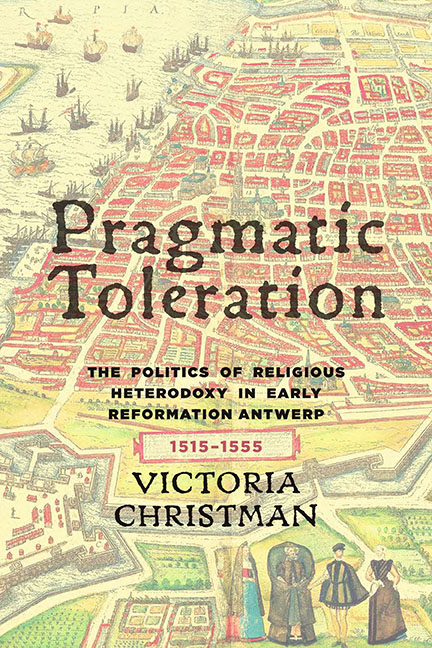Book contents
- Frontmatter
- Dedication
- Epigraph
- Contents
- Acknowledgments
- Introduction
- 1 The Lay of the Land: Government and Law in Brabant
- 2 Undercover: The Claes vander Elst Conventicle
- 3 Pragmatic Intolerance: Antwerp's Anabaptists
- 4 People of the Book: Heterodox Printers and Publishers in Antwerp
- 5 Between Stage and Scaffold: Rederijker Trials in Antwerp
- 6 Trade in Tolerance: The Portuguese New Christians in Antwerp, 1526–50
- Conclusion: Rulers and Religious Renegades
- Appendix 1 Chronology of Antiheresy Legislation in Brabant
- Appendix 2 Answers at Ghent
- Abbreviations
- Notes
- Bibliography
- Index
Conclusion: Rulers and Religious Renegades
Published online by Cambridge University Press: 15 March 2018
- Frontmatter
- Dedication
- Epigraph
- Contents
- Acknowledgments
- Introduction
- 1 The Lay of the Land: Government and Law in Brabant
- 2 Undercover: The Claes vander Elst Conventicle
- 3 Pragmatic Intolerance: Antwerp's Anabaptists
- 4 People of the Book: Heterodox Printers and Publishers in Antwerp
- 5 Between Stage and Scaffold: Rederijker Trials in Antwerp
- 6 Trade in Tolerance: The Portuguese New Christians in Antwerp, 1526–50
- Conclusion: Rulers and Religious Renegades
- Appendix 1 Chronology of Antiheresy Legislation in Brabant
- Appendix 2 Answers at Ghent
- Abbreviations
- Notes
- Bibliography
- Index
Summary
This book began with the story of the young humanist and Bible translator Francisco de Enzinas delivering his newly completed, illegal copy of the Bible to the Holy Roman emperor, Charles V, who possessed the power to execute him for such an offense. Enzinas's story reveals Antwerp as a city rife with religious license, in which pragmatic forms of toleration were exercised daily. The reckless audacity with which this young Spanish upstart acted in imagining that the emperor himself would not balk at his vernacular biblical translation becomes comprehensible only when viewed against the backdrop of a city in which myriad illicit publications were produced, conventicles gathered, and heterodox plays were performed, all with the tacit consent of the municipal authorities. Yet, behind the scenes of this permissive atmosphere, lay a complex politics of religious forbearance. The city's religiously tolerant stance was not politically neutral, but was a calculated position taken in conscious defiance of the emperor and his queens-regent. Nor did the Antwerp city fathers intend their tolerant practices to be applied universally. Dissidents such as the Anabaptists, whom they feared as potentially seditious and who lacked economic worth, they treated with deadly hostility. Rather, they sought to actively defend only those heterodox inhabitants whose presence benefited the municipality in real and concrete ways.
This was a period in which tolerance of religious difference was seen as a negative value, rather than as an ideal to be pursued by those in positions of power. Yet, despite the challenges inherent in the growth of increasingly confessionalized religious coexistence, the fact that religious dissent was not quashed entirely is evidence that early modern people managed to successfully exercise forms of toleration on a daily basis. Antwerp serves as an excellent example of a city in which political and economic interests combined as powerful incentives for municipal leaders to develop means of peaceful religious coexistence. Antwerp was not, of course, unique in this regard. Throughout the Holy Roman Empire, individual voices of opposition rose against Charles's religious policies and the harsh means used to impose them. In recent years, there has been a burgeoning of research into the daily realities of tolerant practices in the late sixteenth and early seventeenth centuries, but scholars have so far failed to closely examine the earlier period for evidence of the same.
- Type
- Chapter
- Information
- Pragmatic TolerationThe Politics of Religious Heterodoxy in Early Reformation Antwerp, 1515–1555, pp. 131 - 136Publisher: Boydell & BrewerPrint publication year: 2015



